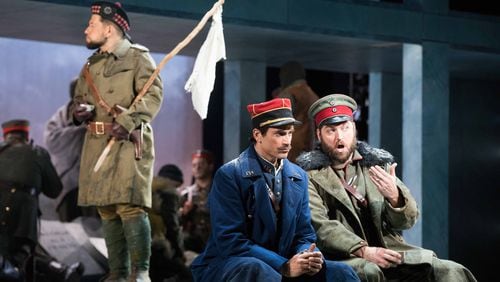OPERA REVIEW
The Atlanta Opera’s “Silent Night”
7:30 p.m. Nov. 8; 8 p.m. Nov. 11; 3 p.m. Nov. 13. $35-$131. Cobb Energy Performing Arts Centre, 2800 Cobb Galleria Parkway, Atlanta. 404-881-8885, www.atlantaopera.org.
"Entrenchment" is a metaphor derived from the notoriously deadlocked mode of World War I combat, and it's often fittingly applied to the current American political scene. One of the problems with entrenchment, dramatized so beautifully in the Southeastern premiere of the Pulitzer Prize-winning contemporary opera "Silent Night" running at the Cobb Energy Performing Arts Center through Nov. 13, is that we seldom really see the enemy.
The production, coincidentally timed with one of the most contentiously entrenched elections in modern history, serves as a reminder that although powerful forces may be in fierce opposition, those of us with boots on the ground usually have far more in common than we differ.
The work, which premiered in 2011 as a commission by the Minnesota Opera, is based on the 2005 film “Joyeux Noël,” which tells the true story of the Christmas truce, a short-lived cease-fire between entrenched enemy combatants during World War I.
Erhard Rom’s simple but effective set inventively solves the problem of simultaneously showing action in multiple locations by placing performers on three levels of a multitiered set. The audience sees behind French, British and German lines, and it’s never difficult to follow the narrative thread from one setting to the next. However, the stage picture often ends up feeling crowded, frontal and two-dimensional, especially on the two upper levels, which are smaller than the lower.
Still, the periodic lowering of an enormous stage flat showing a World War I monument and the use of the scrim, as in scenes at an elegant party at the Kronprinz’s lush schloss a world away from the front lines, are visually effective, and the number of large-scale emotions and effects that are evoked with the few simple elements is impressive.
Kevin Puts’ score creates a rich sound world, masterfully weaving in the sounds of national anthems, gunfire, drinking songs, exploding shells and Scottish bagpipes to evoke the chaotic and varied soundscape of World War I. His use of the full symphony is always emotionally legible, often lushly melodic and cinematic, but it’s in the score’s most stripped down moments that the piece truly finds its center. Soprano Ava Pine as Anna Sorenson sings an a cappella solo ending Act 1, an unforgettable moment, a quiet, plaintive hymn sung by a lone female voice in a brutal, all-male war-torn wasteland.
Pine’s duets with male lead David Blalock as Nikolaus Sprink are especially strong throughout. Their voices combine beautifully, and though we follow several stories, their characters’ narrative thread becomes the opera’s heart and soul. The pair play, literally, a pair of opera singers whose world is shaken by the events of World War I. The songs they sing in formal situations may seem hopelessly out of touch as their art form begins to lose its urgency, but it is, tellingly, music that begins and extends the Christmas truce. Blalock’s heroic tenor voice as he and Ava surrender to French troops creates the performance’s best, most heart-rending scene.
A similarly effective but very different moment involves the three generals — British, French and German — being informed of the Christmas truce, a sinister trio expressing dissatisfaction with the development. Also beautifully rendered are the opera’s parallel storylines: Matthew Worth and Craig Irvin as two commanders of opposing armies who develop a sudden friendship (they bond over their mutual love of Paris), and Jonathan Dale as the Scottish soldier Alexander Sprague, who is so racked with guilt over the death of his brother on the battlefield that not even a cease-fire can bring him a sense of peace.
Librettist Mark Campbell wisely tells these stories in multiple languages, no problem in the world of opera where songs sung in French and German are de rigueur, as are the English supertitles above the stage. The original languages give a sense of the distinct worlds of the various soldiers and also the difficulty in surmounting the divides between them. Even separated by their languages, the soldiers still find their shared humanity as they come into close contact. The tragedy of “Silent Night,” the tragedy of entrenchment, is that such moments are so rare, and so fragile.
About the Author






